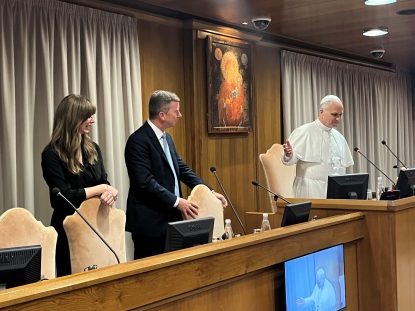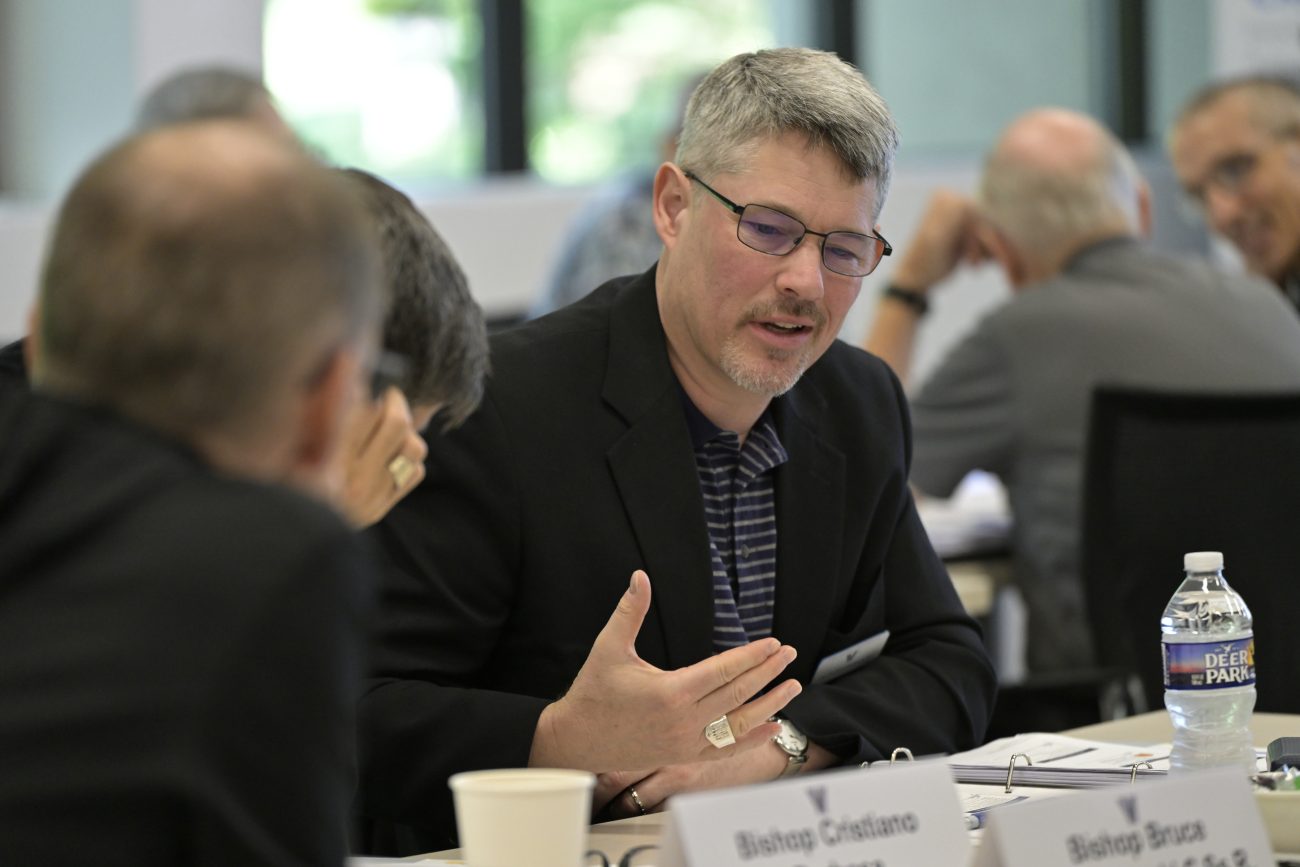A Villanova University program is helping newer bishops in Philadelphia and across North America grow their management skills and better equip them to lead the faithful — all with the blessing and encouragement of a Villanova graduate, Pope Leo XIV.
The Villanova Center for Church Management, part of the university’s School of Business, opened its doors to 14 bishops from throughout the continent in July for a program called “Church Management and the Diocesan Apostolate.”
The four-day program was designed to help them understand the practical challenges that diocesan leaders face, and the kind of administrative competencies and solutions many bishops said they wish they had.
“It was awesome. It was very worthwhile,” said Bishop Keith J. Chylinski, who was appointed an auxiliary bishop of Philadelphia by Pope Francis in December 2023. He now oversees Catholic education in the Archdiocese as just one part of his ministry.
“The level of sharing and openness and honesty and vulnerability was very refreshing; the sharing of good ideas, sharing mistakes that we’ve made, sharing successes.”
A private family foundation funded the entire experience.
The program came as the brainchild of the Center for Church Management, which began in 2004 to channel the Augustinian Catholic tradition into strategic, pastoral, and financial expertise to better serve the Church.

Chesley Turner, Executive Director of the Villanova Center for Church Management, and Matt Manion, David Grenon Family Faculty Director for the Center, share an update with Pope Leo XIV this September on the success of Villanova’s Church Management and the Diocesan Apostolate program. The Holy Father expressed his support and invited them to present it again to the incoming cohort of bishops last month. (Photo by Charles Cognata)
“The Church is not a business,” said Matt Manion, the David Grenon Family Faculty Director for the Center for Church Management.
“The Church is an organization with a world-changing mission of sharing the good news of Jesus Christ, but it is an organization, and leaders have a responsibility to steward the people, the money, and the other resources in a way that is worthy of the Gospel.”
The center has run a similar program for priests and seminarians for nearly a decade, but now the program rises to a new level to serve the unique responsibilities of bishops.
“We want to better equip (bishops) for that part of (their) role, so it doesn’t take up a disproportionate amount of time and mental space,” said Manion.
“We proposed the concept to then-Cardinal Robert Prevost in his role as the head of the Dicastery for Bishops. He said, ‘Why don’t you come over, make a presentation to the new bishops when they’re in Rome in September?’”
They shared that presentation, and the 1977 graduate of Villanova, now the Holy Father, gave his blessing to the program.
Bishops traveled from near and far to the Main Line campus on July 21 with a dinner and presentation from retired Des Moines Bishop Richard Pates on “What I Wish I Knew When I Was Ordained a Bishop.”
Bishop Bruce Lewandowski, C.Ss.R., of Providence, Rhode Island joined Bishop Chylinski and others who saw human resources as a critical knowledge and skill base where they sought growth.
“HR is an art,” said Bishop Lewandowski, a former pastor and vicar of cultural ministries in Philadelphia. “You really have to work hard at developing those skills and abilities in human resources, and a lot of Church life and administration is dealing with people when they’re at their best and when they’re at their worst.
“To know the legal ramifications, to know the pastoral, practical, and professional skills and tools that you need, you develop those over the course of time.”
Human resources was just one of five topics that bishops covered in four days of sessions. Others included bridging mission and diocesan management, understanding financial reports, budgeting for mission, and making decisions regarding synodality and pastoral strategies.
“The presenters were faithful individuals, people who love the Church and wanted to share their business and their leadership acumen with us, so that we would have greater confidence and be able to expand our skillset in doing that in our own roles — whether an auxiliary bishop or a bishop of a diocese,” said Philadelphia Auxiliary Bishop Christopher R. Cooke.
“Each of the presenters wove in the Augustinian charism and the spirituality of St. Augustine into their presentations,” Bishop Lewandowski added. “You think, ‘What does that have to do with administration, business, a budget and finance council, fundraising?’ I left it feeling like it had everything to do with it.”
The Villanova faculty, he said, told the bishops to “‘Look at your budget and you’ll see your priorities.’ A bishop may say ‘My priority is for the poor.’ But when you look at their budget, the least amount of money they give is for programs for the poor. So, if you say this is your priority, why don’t your finances, your dollars and cents, reflect that?”
The bishops also found profound meaning in how even as they spent 15 hours in lecture and discussion sessions, they also spent time in Mass with music provided by Villanova University, group prayer and open chapel times on the Villanova campus.
“They really, I think, opened up a sacred space for us,” said Bishop Chylinski.
“It made a good balance and opened up to a deeper sharing and trust among us that we could get into some really good discussions and discuss serious issues.”
The weekend, marked by the functional expertise from the Center for Church Management and the attending bishops’ willingness to grow, delivered a way to help them more effectively shepherd God’s people in their dioceses.
“When you have prayer, learning, fraternal gatherings, opportunity to process, time with God — I think that really makes for a good program when you also have really talented individuals who love the Church that are facilitating our learning,” said Bishop Cooke.
Manion said he was impressed by the bishops’ desire to learn and “their humility to say ‘This is something I don’t know enough about.’ As a model of ongoing formation and learning, to see this from our bishops was a real gift.”
Meanwhile, it appears that Pope Leo XIV is open to more ongoing formation for more North American bishops at his alma mater.
“We did give him an update on how the program went, and he was pleased about it. He invited us back in early September to propose it again to the new incoming cohort of bishops,” said Manion.
In this way Villanova University appears poised to continue applying its Augustinian charism and expertise to helping bishops become more effective leaders in the Catholic Church across North America.
PREVIOUS: Friendship Celebration to Welcome Jay Wright, Host Saint’s Relic, Gather in Faith
NEXT: Parishes to Hold In-Pew Commitment Weekend for Catholic Charities Appeal Oct. 11-12



Share this story